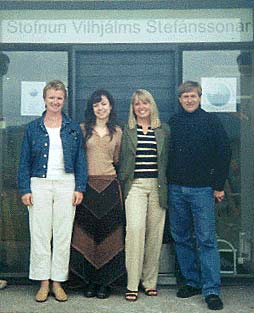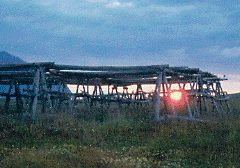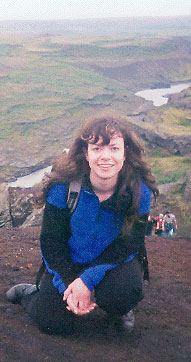Stefansson Arctic Institute, Akureyri, Iceland
 I spent the summer of 2003 working at the Stefansson Arctic Institute in Akureyri, Iceland. There, I had the opportunity to work under the supervision of Doctor Joan Nymand Larsen, who is heading up the production of The Arctic Human Development Report. This report, which will be presented at the conclusion of Iceland's chairmanship of the Arctic Council next year, will be composed of approximately thirteen chapters which will chart legal, socio-cultural, political, economic, demographic, and environmental trends in the Arctic. It will place a special focus upon the status of aboriginal peoples who comprise such a vital component of the Arctic population. It will touch upon common challenges faced by the people of the Arctic, while avoiding the pessimism that often plagues such endeavours through the inclusion of a wide variety of "success-story" case studies. As such, it will provide a roadmap for policy-making, a source of policy strategies, and a fact-rich databank. Such a project has never before reflected the particular dynamics of the Arctic; as such it is a rich resource for any number of organizations. It will also serve an educative purpose. Indeed, it is closely allied with the work of the University of the Arctic.
I spent the summer of 2003 working at the Stefansson Arctic Institute in Akureyri, Iceland. There, I had the opportunity to work under the supervision of Doctor Joan Nymand Larsen, who is heading up the production of The Arctic Human Development Report. This report, which will be presented at the conclusion of Iceland's chairmanship of the Arctic Council next year, will be composed of approximately thirteen chapters which will chart legal, socio-cultural, political, economic, demographic, and environmental trends in the Arctic. It will place a special focus upon the status of aboriginal peoples who comprise such a vital component of the Arctic population. It will touch upon common challenges faced by the people of the Arctic, while avoiding the pessimism that often plagues such endeavours through the inclusion of a wide variety of "success-story" case studies. As such, it will provide a roadmap for policy-making, a source of policy strategies, and a fact-rich databank. Such a project has never before reflected the particular dynamics of the Arctic; as such it is a rich resource for any number of organizations. It will also serve an educative purpose. Indeed, it is closely allied with the work of the University of the Arctic.
While the Arctic Council itself is rather large, it is in fact characterized by a compact Council which delegates projects to its cooperating network of associations and organizations. The Stefansson Arctic Institute is one such organization. The staff was small; in addition to myself there were two visiting  scholars from the Siberian branch of Northern Forum (working on a conference about long-distance education and tele-medicine in the North), two senior scientists (one economist - Dr. Larsen, and one anthropologist), the office manager, and the director. As an intern, my job was primarily to assist Dr. Larsen. I helped to prepare for a conference of the Report's head writers. I attended that conference in Reykjavik, and then prepared a report which was a product of that meeting. I reviewed a number of articles and speeches on international law as it is made manifest in the Arctic. It was sent to all attendees, as well as other interested parties. I conducted various research tasks for the report, with a special focus upon Iceland, Greenland, and the Faroe Island's status within the Arctic. I also assisted with everyday endeavours of the Institute, which at that time was preparing to receive Ms. Adrienne Clarkson. Indeed, the Honourable Ms. Clarkson made the Institute and its work on the Arctic Human Development Report the focal point of her Icelandic stop on her tour of the circumpolar world this autumn.
scholars from the Siberian branch of Northern Forum (working on a conference about long-distance education and tele-medicine in the North), two senior scientists (one economist - Dr. Larsen, and one anthropologist), the office manager, and the director. As an intern, my job was primarily to assist Dr. Larsen. I helped to prepare for a conference of the Report's head writers. I attended that conference in Reykjavik, and then prepared a report which was a product of that meeting. I reviewed a number of articles and speeches on international law as it is made manifest in the Arctic. It was sent to all attendees, as well as other interested parties. I conducted various research tasks for the report, with a special focus upon Iceland, Greenland, and the Faroe Island's status within the Arctic. I also assisted with everyday endeavours of the Institute, which at that time was preparing to receive Ms. Adrienne Clarkson. Indeed, the Honourable Ms. Clarkson made the Institute and its work on the Arctic Human Development Report the focal point of her Icelandic stop on her tour of the circumpolar world this autumn.
 My experience as part of the International Human Rights Program was unparalleled. I had the opportunity to meet a number of leaders in the field of Arctic human rights and aboriginal law. I was able to build upon my knowledge of the Arctic through these encounters, and also to expand that knowledge through various challenging conversations with Icelandic, Canadian, Danish, Norwegian, Greenlandic, Finnish, Russian, German, American and British activists and academics. On a daily basis, I was able to work at a truly international institution, with a similarly international staff. In addition, I was able to learn more about Icelandic society, politics, and law -- an experience which, in itself, was incredibly rewarding.
My experience as part of the International Human Rights Program was unparalleled. I had the opportunity to meet a number of leaders in the field of Arctic human rights and aboriginal law. I was able to build upon my knowledge of the Arctic through these encounters, and also to expand that knowledge through various challenging conversations with Icelandic, Canadian, Danish, Norwegian, Greenlandic, Finnish, Russian, German, American and British activists and academics. On a daily basis, I was able to work at a truly international institution, with a similarly international staff. In addition, I was able to learn more about Icelandic society, politics, and law -- an experience which, in itself, was incredibly rewarding.

 I spent the summer of 2003 working at the Stefansson Arctic Institute in Akureyri, Iceland. There, I had the opportunity to work under the supervision of Doctor Joan Nymand Larsen, who is heading up the production of The Arctic Human Development Report. This report, which will be presented at the conclusion of Iceland's chairmanship of the Arctic Council next year, will be composed of approximately thirteen chapters which will chart legal, socio-cultural, political, economic, demographic, and environmental trends in the Arctic. It will place a special focus upon the status of aboriginal peoples who comprise such a vital component of the Arctic population. It will touch upon common challenges faced by the people of the Arctic, while avoiding the pessimism that often plagues such endeavours through the inclusion of a wide variety of "success-story" case studies. As such, it will provide a roadmap for policy-making, a source of policy strategies, and a fact-rich databank. Such a project has never before reflected the particular dynamics of the Arctic; as such it is a rich resource for any number of organizations. It will also serve an educative purpose. Indeed, it is closely allied with the work of the University of the Arctic.
I spent the summer of 2003 working at the Stefansson Arctic Institute in Akureyri, Iceland. There, I had the opportunity to work under the supervision of Doctor Joan Nymand Larsen, who is heading up the production of The Arctic Human Development Report. This report, which will be presented at the conclusion of Iceland's chairmanship of the Arctic Council next year, will be composed of approximately thirteen chapters which will chart legal, socio-cultural, political, economic, demographic, and environmental trends in the Arctic. It will place a special focus upon the status of aboriginal peoples who comprise such a vital component of the Arctic population. It will touch upon common challenges faced by the people of the Arctic, while avoiding the pessimism that often plagues such endeavours through the inclusion of a wide variety of "success-story" case studies. As such, it will provide a roadmap for policy-making, a source of policy strategies, and a fact-rich databank. Such a project has never before reflected the particular dynamics of the Arctic; as such it is a rich resource for any number of organizations. It will also serve an educative purpose. Indeed, it is closely allied with the work of the University of the Arctic. scholars from the Siberian branch of Northern Forum (working on a conference about long-distance education and tele-medicine in the North), two senior scientists (one economist - Dr. Larsen, and one anthropologist), the office manager, and the director. As an intern, my job was primarily to assist Dr. Larsen. I helped to prepare for a conference of the Report's head writers. I attended that conference in Reykjavik, and then prepared a report which was a product of that meeting. I reviewed a number of articles and speeches on international law as it is made manifest in the Arctic. It was sent to all attendees, as well as other interested parties. I conducted various research tasks for the report, with a special focus upon Iceland, Greenland, and the Faroe Island's status within the Arctic. I also assisted with everyday endeavours of the Institute, which at that time was preparing to receive Ms. Adrienne Clarkson. Indeed, the Honourable Ms. Clarkson made the Institute and its work on the Arctic Human Development Report the focal point of her Icelandic stop on her tour of the circumpolar world this autumn.
scholars from the Siberian branch of Northern Forum (working on a conference about long-distance education and tele-medicine in the North), two senior scientists (one economist - Dr. Larsen, and one anthropologist), the office manager, and the director. As an intern, my job was primarily to assist Dr. Larsen. I helped to prepare for a conference of the Report's head writers. I attended that conference in Reykjavik, and then prepared a report which was a product of that meeting. I reviewed a number of articles and speeches on international law as it is made manifest in the Arctic. It was sent to all attendees, as well as other interested parties. I conducted various research tasks for the report, with a special focus upon Iceland, Greenland, and the Faroe Island's status within the Arctic. I also assisted with everyday endeavours of the Institute, which at that time was preparing to receive Ms. Adrienne Clarkson. Indeed, the Honourable Ms. Clarkson made the Institute and its work on the Arctic Human Development Report the focal point of her Icelandic stop on her tour of the circumpolar world this autumn. My experience as part of the International Human Rights Program was unparalleled. I had the opportunity to meet a number of leaders in the field of Arctic human rights and aboriginal law. I was able to build upon my knowledge of the Arctic through these encounters, and also to expand that knowledge through various challenging conversations with Icelandic, Canadian, Danish, Norwegian, Greenlandic, Finnish, Russian, German, American and British activists and academics. On a daily basis, I was able to work at a truly international institution, with a similarly international staff. In addition, I was able to learn more about Icelandic society, politics, and law -- an experience which, in itself, was incredibly rewarding.
My experience as part of the International Human Rights Program was unparalleled. I had the opportunity to meet a number of leaders in the field of Arctic human rights and aboriginal law. I was able to build upon my knowledge of the Arctic through these encounters, and also to expand that knowledge through various challenging conversations with Icelandic, Canadian, Danish, Norwegian, Greenlandic, Finnish, Russian, German, American and British activists and academics. On a daily basis, I was able to work at a truly international institution, with a similarly international staff. In addition, I was able to learn more about Icelandic society, politics, and law -- an experience which, in itself, was incredibly rewarding.